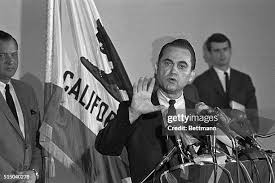
Introduction
George Wallace, a name synonymous with a tumultuous era in American politics, remains a significant figure in discussions surrounding civil rights and segregation. Serving as the Governor of Alabama for four terms, Wallace’s political trajectory reflects both the challenges and transformations of mid-20th century America.
Early Life and Political Rise
George C. Wallace was born on August 25, 1919, in Clayton, Alabama. After graduating from the University of Alabama School of Law in 1942, he entered public service, initially as a state legislator and later as a circuit judge. His first foray into the governorship came in 1963, characterized by his infamous declaration, “Segregation now, segregation tomorrow, segregation forever.” This slogan underscored his staunch opposition to racial integration.
Impact on Civil Rights
Wallace’s administration was marked by clashes with federal authorities and civil rights activists. His staunch support for segregation led to significant confrontations, notably the 1965 Selma to Montgomery marches, which highlighted the struggle for voting rights. His policies were instrumental in galvanizing support among segregationists while simultaneously drawing ire from civil rights leaders such as Martin Luther King Jr.
Shift in Political Strategy
However, Wallace’s political ideology evolved over time. In the 1970s, he began to broaden his platform, appealing to working-class whites and advocating for issues such as education and economic development. This shift was evident as he ran for president in 1968 as a third-party candidate, capturing 13% of the popular vote and highlighting the enduring appeal of his populist rhetoric.
Legacy and Reassessment
The legacy of George Wallace is complex. While he is often remembered for his divisive policies, later in life, he expressed regret for his earlier positions, acknowledging the harm caused by his rhetoric and actions. His later years were marked by attempts to reconcile with the African American community in Alabama, illustrating a nuanced evolution in his understanding of race relations.
Conclusion
George Wallace’s impact on American politics serves as a reminder of the deep divisions that have shaped the United States. Today, discussions surrounding his legacy prompt reflections on the enduring issues of race, equality, and political identity. As America continues to grapple with these challenges, Wallace’s life offers insight into the complexities of political belief transformation and the ongoing struggle for civil rights.



